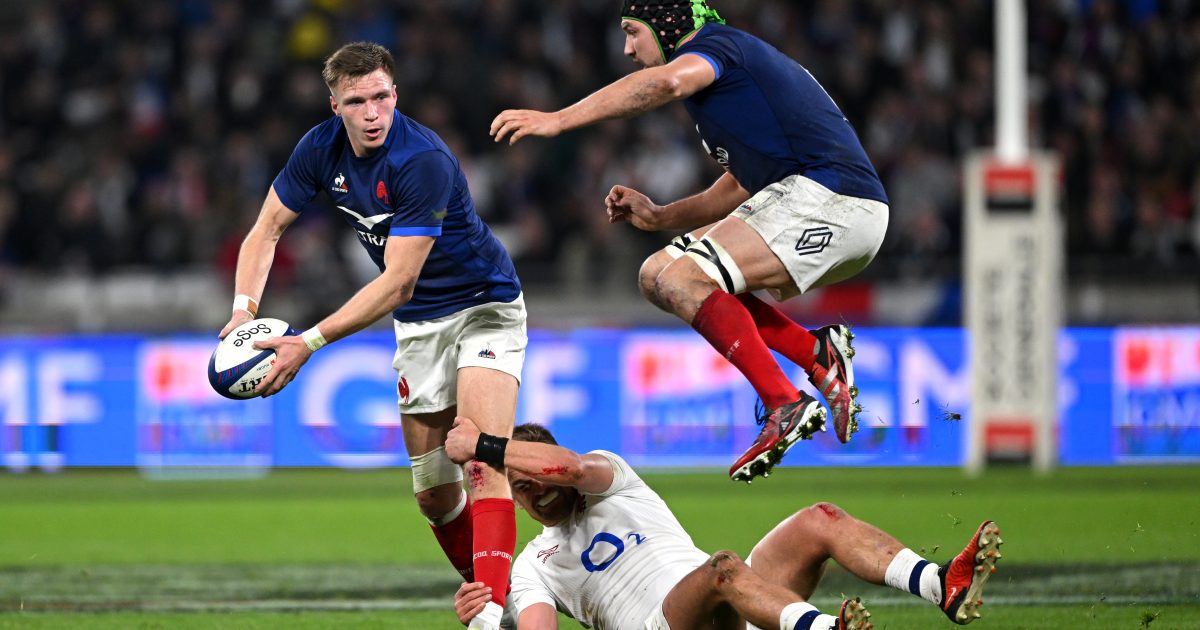La France sauve son Tournoi in-extremis

La France a finalement sauvé son Tournoi des Six Nations 2024 en s’imposant in-extremis face à l’Angleterre à Lyon, 33-31, ce qui lui permet de finir à la deuxième place du classement derrière l’Irlande.
Les Français étaient bien lancés chez eux, dans un Groupama Stadium acquis, bercés par la confiance gagnée suite à leur victoire record de la semaine précédente contre le Pays de Galles. Mais un plaquage manqué de Ollie Lawrence juste avant la pause a commencé à dérailler la machine qui semblait si bien huilée.
Osant enfin lancer leur jeu, les Anglais ont imposé 21 points sans réponse en six minutes au cœur du match avant de faire rentrer du sang frais et de relancer la rencontre. La détermination des Français a fait le reste.
Les Bleus avaient commencé plein gaz face à des Anglais qui, très vite, montraient des signes de fatigue alors qu’ils avaient bénéficié d’un jour de préparation en plus. George Furbank blessé à la 7e (et remplacé par l’électrique et décisif Marcus Smith), Alex Mitchell embêté par son poignet gauche et Sam Underhill par ses crampons.
Les Anglais n’y étaient pas et subissaient la furia des Bleus, tentant à plusieurs reprises de ralentir un rythme fou. Certes George Ford avait ouvert le score par une pénalité (11e), mais ensuite Thomas Ramos avait pris la suite avec quatre coups de pied réussis sur quatre.
Mettant beaucoup d’agressivité et de pression à l’image d’Emmanuel Meafou qui n’hésitait à dégager les Earl et autre Itoje d’un revers de la main gauche, les Français ont mis en pratique le mot d’ordre du sélectionneur Fabien Galthié : avancer.
Il en est ainsi allé de cette touche de Jamie George dans les 22 tricolores déviée par François Cros, remontée de quatre passes au large avant de trouver Fickou qui a passé à Léo Barré transmettant à Nolann Le Garrec pour le premier essai de la rencontre (19e). Une action collective qui témoignait de la détermination et de la solidité des Français.
Menant 16-3, les Bleus ont néanmoins encaissé un essai juste avant la pause par le trois-quarts centre Ollie Lawrence suite à une pénaltouche anglaise (40e) à cinq mètres de leur ligne ; pénaltouche sur laquelle ils venaient d’être pénalisés deux fois.
A six points d’écart, les Anglais ont lancé les hostilités grâce au bras tendu du même Lawrence (41e), puis à un franchissement de Ben Earl concrétisé par Smith (46e) avant que leur première ligne ne soit entièrement remplacée. N’en jetez plus !
Après cette séquence cauchemardesque de sept minutes, les Français réussirent à remettre la main sur le ballon et ainsi dérouler leur jeu rapide, précis, juste. Une action entamée par Le Garrec, relayée par Charles Ollivon et conclue par Léo Barré redonnait l’avantage aux Bleus (55e). Cinq minutes plus tard, une touche anglaise manquée, déviée au pied par Ramos permettait à Fickou de creuser l’écart (58e).
Un écart comblé plus tard par les Anglais qui repassaient devant à un point suite à un essai de Freeman (75e). Mais une pénalité face aux poteaux laissait une ultime chance aux Français de remporter la victoire. Faisant preuve de sang-froid, Ramos n’a pas tremblé à 47 mètres face aux poteaux (6 coups de pied réussis sur 7), délivrant la France d’un match oppressant et d’un Tournoi compliqué.

















































